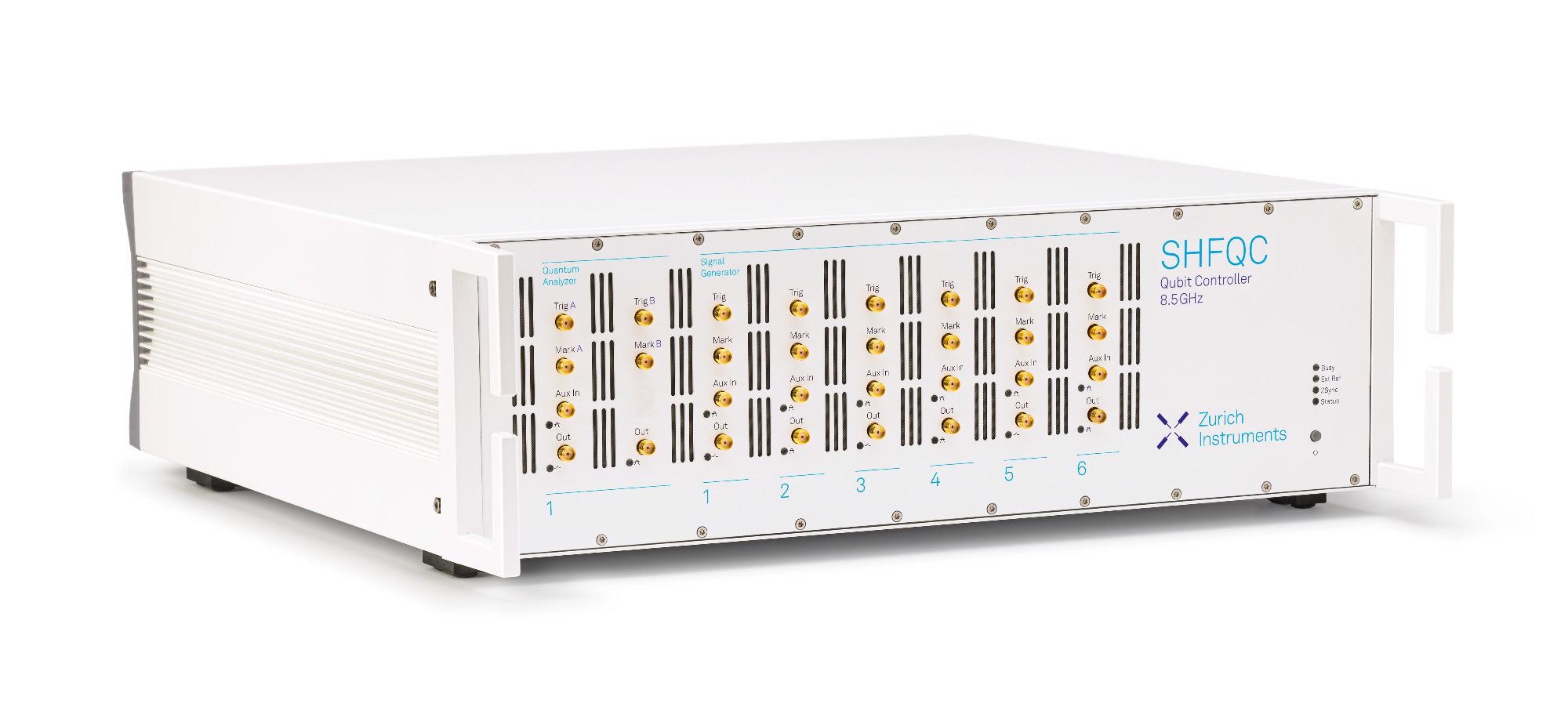The Zurich Instruments SHFQC Qubit Controller offers a full room-temperature qubit control system for up to 6 superconducting qubits in a single instrument. The SHFQC provides channels for driving high-fidelity single- or two-qubit gates, perform single-shot multiplexed qubit readout, and perform fast feedback or error correction protocols. Like other elements of the Zurich Instruments Quantum Computing Control System (QCCS), all channels of the SHFQC work at microwave frequencies with great spectral purity and stability, so that users do not need to rely on tedious mixer calibration. Operation of the SHFQC through Zurich Instruments' Python APIs, LabOne, and the LabOne QCCS Software gives access to an intuitive approach to demanding tasks such as automated system tune-up or the execution of complex algorithms, thus enabling system up-time and measurement speed-up.

Image credit: Zurich Instruments
Concept
The SHFQC provides a full qubit control setup for controlling, reading out and performing fast feedback on up to 6 superconducting qubits as a single instrument. The setup is fully software-operated and thus simple to reconfigure. When using several SHFQCs, the control system can be extended to support larger qubit numbers and thus adds fast local feedback to global error correction.
Thanks to the operating range from DC to 8.5 GHz and the combination with a linear amplification chain, each of the 6 high-performance control channels of the SHFQC can drive any single- or two-qubit gate in a short time and at the relevant qubit frequency. The readout channel of the SHFQC includes signal generation and detection, and a state-of-the-art signal processing chain that can discriminate between the states of several qubits, qutrits or ququads with high fidelity and in real time. The measurement results are swiftly distributed to all control channels for fast feedback and local error correction protocols. Additional signal processing functions, such as a real-time oscilloscope, fast resonator spectroscopy and powerful sequencers in all channels, round up the capabilities of the SHFQC. Together, the instrument's features enable fast bring-up of the quantum device as well as a reduced system down-time and a significant speed-up of measurements.
As the maturity of available superconducting quantum processors increases, the number of different qubit control techniques can be expected to decrease. This may determine a shift away from individually designed control setups and towards carefully engineered commercial solutions. Until today, small systems with a handful of qubits did not benefit from application-specific, high-performance and versatile solutions that are quick to set up and intuitive to operate. "The SHFQC extends the reach of our next-generation QCCS to smaller setups. Now researchers with a few qubits can profit from integrated, mixer-calibration-free frequency conversion and even more application-specific, high-performance functionality," says Dr. Tobias Thiele, Application Scientist for Quantum Technologies at Zurich Instruments. "Nonetheless, the possibility to scale to larger system sizes remains," Dr. Thiele adds, "as multiple SHFQCs can be combined with other elements of the QCCS to support larger setups."
Software support and system integration
The reduced latency and increased flexibility afforded by processing qubit information within a single instrument can be key to the success of local feedback operations such as fast active or ancilla reset. As part of the QCCS, the SHFQC can also be integrated into new or existing setups consisting of up to 18 other instruments such as the HDAWG Arbitrary Waveform Generator, the SHFSG Signal Generator and the PQSC Programmable Quantum System Controller to scale from few qubits to 100 qubits and beyond. The LabOne software, the new LabOne QCCS Software and the LabOne Python APIs help users handle any combination of QCCS instruments as one system that remains well-synchronized and controlled by a single software interface. Tasks such as experiment tune-up, automated calibration and the execution of complex algorithms therefore become simple and intuitive.
--------------
To read more about the new Zurich Instruments SHFQC Qubit Controller, including the complete list of its specifications, visit www.zhinst.com and the SHFQC instrument page.To arrange a live demo, write to [email protected].
About Zurich Instruments
Zurich Instruments makes cutting-edge instrumentation for scientists and technologists in advanced laboratories who are passionate about phenomena that are often notoriously difficult to measure. The company’s core offering includes lock-in amplifiers, impedance analyzers, arbitrary waveform generators, and the first commercially available quantum computing control system.
Zurich Instruments brings innovation to scientific instrumentation and quantum control systems in the medium-frequency (MF), ultra-high-frequency (UHF) and now also super-high-frequency (SHF) ranges by combining frequency- and time-domain tools within each of its products. This approach reduces the complexity of laboratory setups and unlocks new measurement strategies.